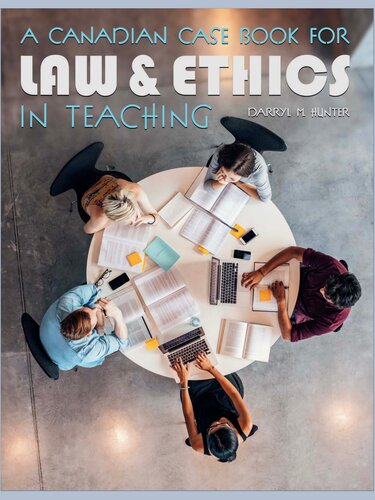

Most ebook files are in PDF format, so you can easily read them using various software such as Foxit Reader or directly on the Google Chrome browser.
Some ebook files are released by publishers in other formats such as .awz, .mobi, .epub, .fb2, etc. You may need to install specific software to read these formats on mobile/PC, such as Calibre.
Please read the tutorial at this link: https://ebookbell.com/faq
We offer FREE conversion to the popular formats you request; however, this may take some time. Therefore, right after payment, please email us, and we will try to provide the service as quickly as possible.
For some exceptional file formats or broken links (if any), please refrain from opening any disputes. Instead, email us first, and we will try to assist within a maximum of 6 hours.
EbookBell Team

4.4
102 reviewsDesigned to support case methods instruction in post secondary education, A Canadian Casebook for Law & Ethics in Teaching provides 80 recent judicial rulings from courts across the country, from British Columbia to Nova Scotia. Cases address key issues in Canadian educational law and ethics for teacher candidates and for aspiring school administrators, such as :
The Canadian Charter of Rights and Freedoms, human rights cases, the law of negligence, minority language laws, labour laws, Criminal Code matters, and Indigenous laws as they relate to K-12 schools are covered.
Well known cases such as Jubran and Ross are included, but other original cases in teachers’ classroom assessment, teachers’ interpretation of evidence, teachers’ use of new technologies, and teachers’ dress in the classroom are found in this anthology.
Each case is authentic, while being lightly edited for use in a typical teacher education class. Cases have been foreshortened to remove unnecessary procedural matters. Each case focuses on the fact situation, the differing positions of the parties, the legal precedents, the court’s judgement, and the rationale. A general introduction is provided for each case, with followup questions about common ethical and legal dilemmas facing the educational practitioner.
Introductory and concluding essays raise provocative questions about using case methods to constructively build teachers’ legal knowledge and promote ethical conduct.